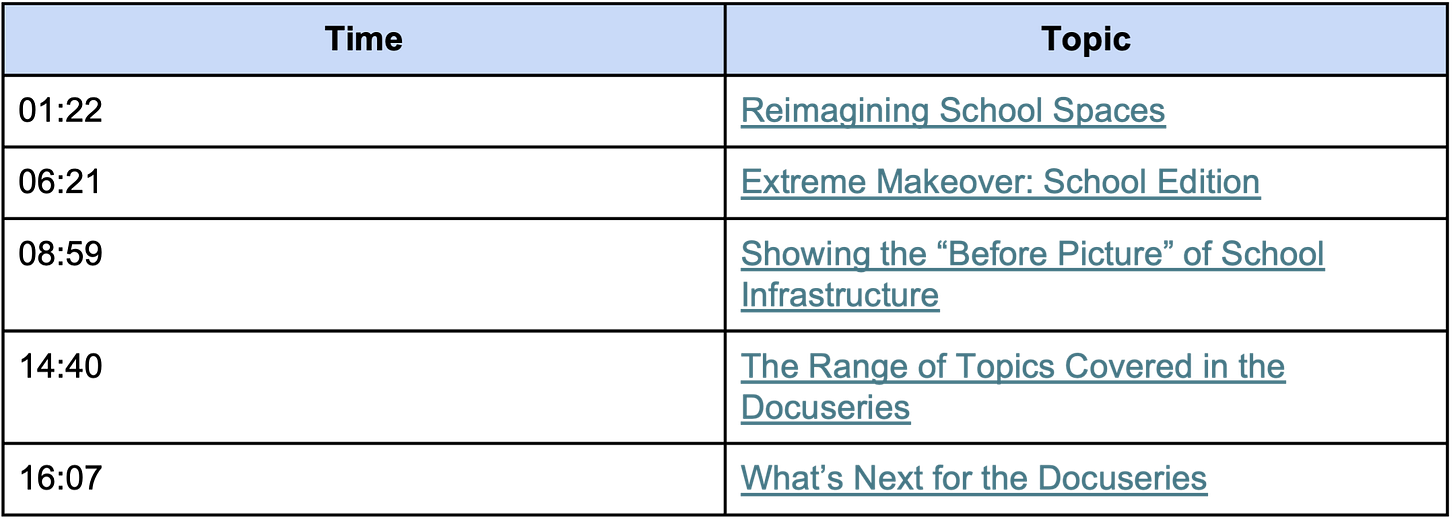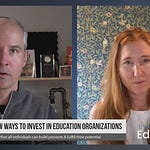Kevin Stoller, CEO of Kay-twelve, a school furniture provider, and Board Chair of the Second Class Foundation, joined me to discuss the importance of reimagining learning spaces in the broader effort to transform education. Kevin shared how his work in creating adaptable school furniture drove him to create a new docuseries on school spaces titled “What We Show Them.” You can watch episode 1 here.
Michael Horn:
Welcome to the Future of Education. I'm Michael Horn, and you are joining the show where we are dedicated to a world in which all individuals can build their passions, fulfill their potential, and live a life of purpose. And to help us think through how we can better do that, particularly in the K12 education system. Delighted that we have Kevin Stoller. He's the CEO of Kay-Twelve. That's spelled K-a-y twelve spelled out so not the normal sort of K12 that you often see. He's the author of the book Creating Better Learning Environments—after my heart—about how do we can think about space and architecture and the furniture inside of places to better facilitate learning. And he's also behind the Second Class Foundation's new docu-series called “What We Show Them,” which we will get into in a little bit in this episode. But first, Kevin, great to see you. We were on a podcast in the midst of the pandemic as I recall together talking about some of these things. It's good to see you here.
Kevin Stoller:
You too. Thanks for having me. You are one of those change makers in education that I always talk about. So I learn a lot from you. I love all the work you're doing. So I just really appreciate you having me on.
Reimagining School Spaces
Michael Horn:
Well, very, very kind of you to say, but I'm excited to learn from you today because you've got a lot of things going. But let's, let's start high level. Introduce yourself to the audience. Like, the premise behind your work more broadly has been what?
Kevin Stoller:
So it's really been around how do we improve education? And I got into this in total, total by accident. I always say that. I ended up. I never thought I was going to be anywhere near education. To me, school was just something you get through. And then I somehow landed in my career of owning a school furniture company. And I still remember the moment where my mindset shifted when I was just walking into really the most ordinary type of school anywhere in the country, happened to be in my backyard when I was living in Worthington, Ohio, and walked into the lobby. And this time something felt different. Something felt different. I went to go check in with the principal that I was going to meet with, and I just felt there's this, like, buzz coming from this one wing of the school. Like there was this, like, almost like electricity coming. And he comes out and he's one of those. One of those principals that just like everyone, like, looks up to and loves. He just makes everyone feel great. It's one of those where it's like people want to move into the boundaries of his school so your kids can go, yeah. And he just smiles. And he's like, follow me. And I'm like, what? I'm like, what is going on over there? And he shows me. Brings me into a classroom and shows me a teacher. And she goes, watch this. And she has all the students kind of in a U shape around her, and they're all paying attention, and she explains what they're going to do today. And then all of a sudden she does like a clap, like a break, like they're breaking from their huddle and they go. And they immediately go into groups of three or four working together. One kid you would see, like, break away from the side and start doing some solo work just trying to comprehend something, then come back in. She would just kind of dance around the classroom and all of this would happen. And by the end, there'd be presentations that would happen in there. And then she'd bring them all together and wrap it up. And it was the first time that I realized I'm like, oh, crap, I don't own a school furniture company. Like, my this actually matters. And it was like the moment where, like, we need to figure out how to do this, because these straight rows of classrooms facing the front of the room, like, that's all I knew school was. And that was really the turning point that shifted us from having a school furniture company to having a mission driven how do we improve education company.
Michael Horn:
Very cool. Very cool. Yeah, I've had that experience now a couple times where I've spoken to school furniture companies or design companies or whatever it is, and I got lucky enough to take Vince Scully's class in college. And you just realize so much of how we relate to each other is because of the space in which we inhabit together. And we don't even think about the impact on mood, collaboration, all these patterns. And you're right. Like, if you reframe it, you can all of a sudden be part of that change and create that dynamic, exciting environment that you got to see that day in Ohio. It sounds like.
Kevin Stoller:
Yeah, it really was eye opening to me because it was, you know, like the engagement level that you start seeing in there. And, you know, and that was only the first part of the story, because the other part is we did this in four classrooms. So we were trying out this new furniture in four classrooms, and we go to the other three, and the other three literally would have X's with painter tape of saying, this is where your chair has to go and you cannot move it.
Michael Horn:
Oh, okay.
Kevin Stoller:
So. So it was really like the entry of, like, oh, wow. I can see where it can go. But I also see that this is a much bigger, bigger initiative here, because this isn't just about changing out the furniture. This is about how do you really change the culture and how do you really drive things from the leadership level and, you know, and really changing the perception of what school could actually look like.
Michael Horn:
All right, I have to tell one more story because it's now fun, because my kids, they go to a Montessori school and they're now in fourth grade, but they call the type of school traditional schools that I went to and my wife went to, they call it schools with desks, because to them, that's what it looks like, right? So, like, you went to a school with desks. Let me get this. Like, why did it work that way? And I'm like, I can't really explain to you why, but anyway, there we are. So then you have the Second Class Foundation, where I think you're the board president, and they are launching this docuseries. Tell us about this organization and how it intersects with your work.
Extreme Makeover: School Edition
Kevin Stoller:
Yeah, so what. What really happened was it was a lot of years in works here, and it really came from someone on our team. Kirsten, on our team was like, you know, I'm sitting here and I'm watching all these, like, home renovation shows and, like, these makeover shows, and I see the work we're doing and how it really changes the learning environment and, like, where's, like, an extreme home makeover but school edition of it? So this is really, you know, four or five years in the works of, like, hey, that's a good idea. Why can't someone to do it? And, you know, because we. Our mission is to improve. Improve learning environments. We said, well, this is really the missing piece. It's like, we can talk about these at educational conferences, but we really need the movement to come from outside of the walls of school. How do we get to the point where people, like, just general community members start saying, well, why doesn't my school look like that? Like that? And that was really what we identified early on of, like, that's really the tipping point that if we really want to drive this change, how do we get it to that point where it's not like saying, like, well, don't put this fancy school furniture in my school. It's more of like, why doesn't our school have those types of opportunities for our kids. So we went down this path of saying, hey, can we pitch this show to Netflix? How do we get this on the network? How do we do this? And we quickly learned that either we could sell this concept, we can do this, and we can sell the concept, and then, you know, they can, you know, whoever buys it can do whatever they want. But we said, that's really not the intent of why we want to do this. And we said, well, we really can't do this by getting, like, product placement. We don't want to look like a big commercial. So we were like, we really need to do this as a nonprofit. So we set up the foundation a few years ago, and it's really with a blank slate of how do we improve education through the use of media and storytelling? Because we really want to do a lot of projects like this docuseries that we're launching, but as well as we want to highlight other types of work that's going on and how do we meet people where they're at in a more entertaining format so that this isn't just for people who are seeking kind of education documentaries. How do we do really entertaining, good work that people would want to watch when they're sitting down trying to figure out what do we watch on Netflix tonight?
Showing the ‘Before Picture’ of School Infrastructure
Michael Horn:
Yeah, I, Well, I love that premise of Extreme Makeover School Edition and the demand side of the equation, because I think you're right. And obviously you're. You live in Arizona, so you're in the land of ultra school choice and parents making different decisions around their school at the moment. But I think the bigger premise is correct, which is parents saying, like, no, I'm not settling for the school with desks, because now I know that there's something else out there that can be done that's going to light a fire under my kid. And that's the opportunity that I want. And once community members start demanding these things en masse, you start to see bigger changes, and that's possible. So you're launching this docuseries. It's called “What We Show Them.” I've seen the first pilot episode about a school in Idaho, and I will say it's sobering. We don't see the rebuild in the eight minute segment that I saw or nine minute or whatever it is, but it's, it's a sobering first message. Talk to us about that first episode and sort of the larger arc of what you're hoping to accomplish.
Kevin Stoller:
Yeah, so it was one of those where we had our film crew and we were trying to figure out how do we hit home as fast as possible on this. Because to produce anything, like, at this level, which I would say is at, like, film quality level, like, I mean, it's outstanding.
Michael Horn:
Yeah.
Kevin Stoller:
Like, they did an unbelievable job with this, but they started looking at stories around the country. And what's amazing is they have a lot. There are so many good, like, characters and stories that are going on in education, but this one stood out as, like, we need to capture it right now. Like, we need to go out there right now and capture it. And you use the word sobering. I like that term. I'm probably gonna take that. It's. It's. I've been saying it's heavy. It's a lot heavier than the intention of the whole series. But if you look at any type of good storytelling and the arc is that you look at any movie or any character at the beginning of the book, it usually starts out with. With the situation. And you can almost always predict that the end of the movie or the end of the book is the exact opposite. And I just so look forward to us getting to that point. So we can show the exact opposite, but it is very heavy right now. It's a school in Idaho that honestly, like, at any moment, the school can crumble. They've actually had their gym fall, like, collapse in 1996, and they have not made any structural changes to the school. And Idaho is an interesting one. And when we get into this is, we really want to figure out who's the antagonist in here because we don't want the general public to be like, the enemy on this. But every time they've gone to bond to try to try to get the vote for a bond. Idaho is one of two states that requires a 66.7% approval before the bond can pass. And they've been getting, like, their last vote, they got 54%. 54% in a vote anywhere else in the country is like a landslide victory. But in Idaho, it's not passing. And. And because of that, they are going again, trying to do this and trying to really get ahead of this, and they're doing all the work that they should do. But what I give them credit for, and, you know, and I'd highly recommend that people watch it and we can. We can share the link. What I give this district credit for is that, yes, they want to solve the issue for their school, but they are also Taking on the bigger battle of. They're just one of the communities in Idaho. Everyone is running into the same thing. And these are old facilities that need updating. And they're trying to change that law so that it doesn't require the 66.7%, but just like a normal majority vote where, you know, where, you know, in 48 states, the rest of the country has it that way.
Michael Horn:
So this is a school then that it's still in that state. This is not the other side of nirvana yet. In this particular school.
Kevin Stoller:
No, they actually have, you know, in this November. And so not sure when this. This episode releases before that. But. But they are using.
Michael Horn:
It'll be before the election. Yeah.
Kevin Stoller:
Okay. So they are using it to help get their local support. And I hope they do get the 67%. But. But we wanted to make sure as a film crew, we are not dividing this community and trying to be like, well, the other 46%. What are you thinking? Like that's not the. I mean, that's really wasn't the intent. And the other piece of this too, is that the goal of the docuseries is that we have a whole bunch of different stories that we interweave because movement is slow in education and it is not exciting to watch. So being able to have other districts and not always dealing with facilities, of just having really good characters, which is what we've built up, is we have a list of really good characters that we want to highlight and that allow you to have an emotional connection with them that are just people that you want to see the work they're doing and transpose that. Where some are in amazingly new schools, some are like different stages, some are doing more like micro school. Like really just showing the different landscape of what education actually looks like in this country right now. And where I just keep coming back to in an entertaining format.
The Range of Topics Covered in the Docuseries
Michael Horn:
Yeah. So give real breadth to that vision of what school can and should be over time. But also against this sobering beginning. Just give us a little bit of tease. You said, you know, facilities is not the only entry point into the topics are some of the other entry points that this will tackle.
Kevin Stoller:
Yeah, I mean, one of the storylines that we look at is in the Virgin Islands. I don't know how much you follow what happened there, but literally almost all their schools got destroyed by.
Michael Horn:
Yeah, by storms yeah, okay.
Kevin Stoller:
Yep. So they are going through this and there's an amazing leader that they have that is like. That is rallying up the communities to re-envision. Be like, hey, this is our chance, like, you know, like we, we literally can start from scratch and do this. And it's super fascinating to see what is going on there. And then you have, you know, other ones where we actually have just a community member in Salt Lake City who just has taken a passion on and and is, is taking. Rallying people to just look at, again, look at education differently. And it's. And he is super like energizing and upbeat. So trying to really transpose some of these stories around the country and give a really good like, patchwork of like, hey, we're at a really interesting time in education and a lot of things are happening that maybe you and I see, but I don't think the general public really sees it.
What’s Next for the Docuseries
Michael Horn:
Yeah, no, I think that's right. And you're right. U.S. Virgin Islands, that's the ultimate in, you know, what I would call nonconsumption, where you can truly create something that has not existed before because there's not everyone going to the status quo, if you will, and sort of locked in with the mindset of what this looks like. So, so wind us forward. Let's, you know, this fully gets off the ground. We're having this conversation in September right now, back to school, but play it forward a few years. You know, the nonprofit exists to move change in education through storytelling, through media. What's the hope for this series and beyond of what you catalyze?
Kevin Stoller:
Yeah, our hope for this series is that we raise the money so that we can complete. We have a kind of a story arc of a 10 episode docuseries that once it's produced, being able to sell it and license it to the streaming platforms, it's a lot easier for them when you have a product that they can be like, yep, we can air it now. So that's the goal with this one and we hope it becomes an ongoing one. But obviously like anything like this, you got to take one step at a time and see what the response is. But the nonprofit is really to be meeting people where they're at. We hope we can fund additional projects like this. We hope that we can be affiliated with people that are already producing like this and even things that honestly are probably like some of the low hanging fruit we want to tackle. And I'll use the example out of like any news story that you see on education, the newspaper or the website is grabbing some stock footage of what a school looks like from like 20 years ago. And can we have like an industry like, can we do that? Yeah. Can we upgrade some of the stock footage of what schools are looking like and try to change that perception of like, hey, they don't look like the way they looked in Ferris Bueller. And you know, in the mid-1980s, some still do look that way, but most of them actually don't. But, you know, but if you're not like walking into schools pretty regularly and, and I would say that the majority of adults in America are not really actually going to see the insides of schools very often, how do we change that perception? Because I do think there, there is a big element in this where we're just stuck where people are just like, oh, that's the way school went. Because I went there 30 or 40 years ago. It's probably the same.
Michael Horn:
Yep. Of course, school with desks, as my kids say again. But let's, let's end on this. How can folks find more support? I think it's secondclassfoundation.org/projects if they actually want to see the, the first pilot itself. But, but tell us how, how they can stay in touch and support.
Kevin Stoller:
Yep, perfect. Yeah, that, that is a great place. I just, I think that's a great place to start. Watch that. You can see the story or you can read more about it on the website. But on the Contact Us is really what we're looking for the help for. And we're trying to connect with the organizations, the individuals that can help financially support us but also help in additional ways. We have some additional board seats that are open that we can fill. And then, you know, there's also kind of the volunteer level, you know, like just ones that can help spread the word and share, you know, like share this and other work that we're doing on social media and within their networks. But those are really the three, three things that we're asking for at this point. Trying to find the, you know, like those right donors or organizations or individuals that can do that, board members and the volunteers.
Michael Horn:
Perfect. Kevin, thanks for the work you're doing. Thanks for the storytelling you're doing. Thanks for the reframing you're doing. And for all those tuning in, check out secondclassfoundation.org learn more, see how you can support.












